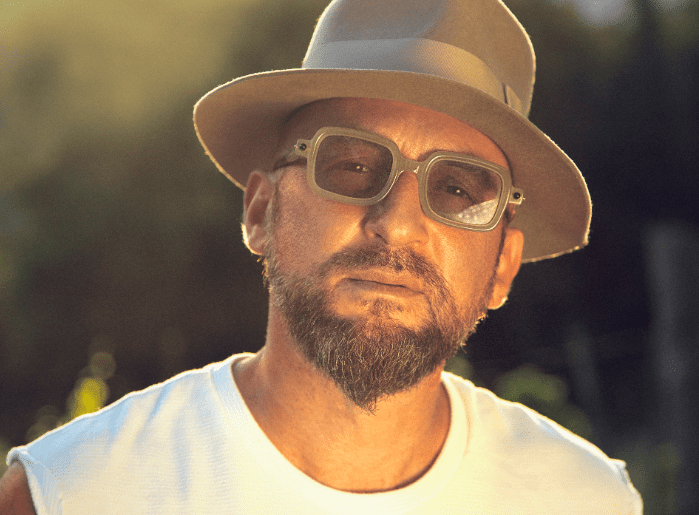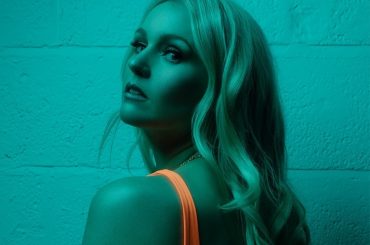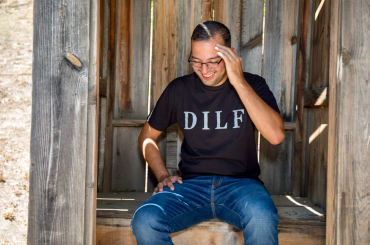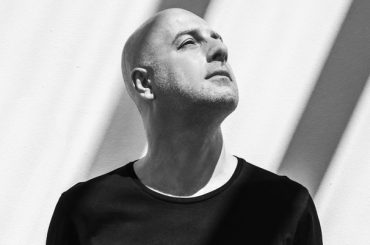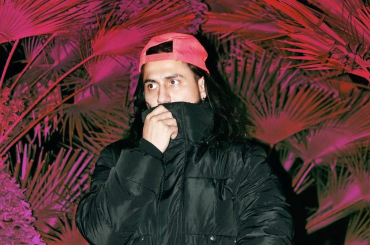In 2020, Damian Lazarus, the DJ/producer/label owner with the excellent name – it sounds completely made-up, but isn’t – was confronted with some of the same challenges shared by all DJs. No gigs and lots of time on his hands to get creative.
Lazarus spent the month prior to the pandemic and the ensuing five lockdown months at home at his idyllic farm in Italy, high atop a mountain, working on his opus, Flourish – the second album under his own name, his fourth overall. Sequestered with his family and his engineer/tour manager/assistant and all-around Man Friday, Paolo Bartolomeo, at his Monastic Studio in the middle of a nearby forest, Lazarus has never had this much uninterrupted time to focus on creation, and mostly likely never will again.
But it was put to good use because Flourish captures all the isolated, nature-driven environs in which it was created, not to mention Lazarus’ fluctuating state of mind. It delves far back into his musical past, unearthing his early drum-n-bass influences, bringing those together with jazzy grooves and skipping house beats or jumpy breakbeats and buzzing basslines. These efforts sometime have a clear view of the dancefloor such as on “Leave,” “Everybody” and “Mountain.” At other times, it looks inward, such as on “Beth” and “Bas.” At yet other times, such as on “Into the Sun,” it is tailor-made for Lazarus’ signature sunrise/sunset selections.
In between keeping an eye on his quarreling goats, shuttering his windows against a pending rainstorm and sipping tiny espressos punctuated by intermittent cigarettes, Lazarus gave DJ Times plenty to chew on. The London-born talent went all the way back to his nascent years, recounting the events and experiences that brought him to the present time as one of the curators of not only singular DJ sets, but taste-making record labels Crosstown Rebels and Rebellion, and magical destination festivals and events such as Day Zero and Get Lost. It went like this:
DJ Times: You’ve been part of the dance-music landscape since the ’90s – what were your first forays into the scene?
Lazarus: It started when I started working at Dazed & Confused magazine around 1996. I was writing, then I was an assistant editor, then music editor. As a journalist, you get an insight into the music industry from an interesting perspective. Magazines work with a two- to three-month advance time period. You know what’s happening in the future.
DJ Times: What was your musical trajectory as far as styles and scenes?
Lazarus: When I first started getting into music, I came from soul, funk, jazz and hip hop, that moved into early acid house, breakbeat, and then into drum-n-bass by 1996. From a media perspective, I was instrumental in helping that scene along. I was the first person to put all these big drum-n-bass artists together for a photo shoot for Dazed & Confused in ’96. I was the first person to start reviewing drum-n-bass records in other magazines at that time, really helping the scene grow.
DJ Times: You got into drum-n-bass right at the start of its rise.
Lazarus: Drum-n-bass provided me with a real idea of the future of electronic music. It felt like tomorrow music. I’d always been buying records and playing records at home. I started to DJ outside of my home city for the first time, in ’96, ’97 – but I’d never broken into any kind of scene as an artist.
DJ Times: How did the separation from drum-n-bass come about?
Lazarus: After three, four years, the music started to dry up. It reached a point where it didn’t sound as future anymore. It didn’t sound as exciting. I had to figure out who I wanted to be as an artist. Mr. C and Paul “Rip” Stone of Plink Plonk [defunct U.K. label] discovered me around that time. Big up to them because they were the first people to see some potential in me as an artist and a DJ. I hadn’t started producing yet. They offered me studio time and put me with Jono Podmore who recorded as Kumo. Later, I worked with Laggy Panteli who was Hijacker and Megalog. They had nights happening at their club, The End, and that’s where I got my first really big break.
DJ Times: The music you released with the City Rockers labels – FC Kahuna, Felix da Housecat, Miss Kitten, Soulwax, Erol Alkan – was just as visionary for the time as the music you release now with Crosstown Rebels. How does that tie in with your DJing?
Lazarus: When we started a club night called 21st Century Body Rockers with all our City Rockers artists and I was the warm-up DJ… that was when the real DJ start happened. No one knew me as a DJ at that point. I was coming out of drum-n-bass and starting fresh in this whole new world which I was creating through City Rockers. At one point, my friends said, “You’re actually getting really good at this. Maybe you could be the DJ you want to be.” It really began for me in 2001.
DJ Times: It was early on in your DJing career that you started playing at DC10 in Ibiza.
Lazarus: Really early on. I had some friends from the U.K. that were working at Manumission in Ibiza. They introduced me to DC10. Having looked around most of the parties at Ibiza at an early age, I knew that was the one for me. It felt so innovative and edgy, dangerous at times, fun, exciting, deep, trippy. I played there for the first time in 2001 or 2002. The following year they invited me back to play two or three times, the last name out of 20 on the lineup, which was great. By 2004, 2005, I was playing there all summer. Now, I’m a resident with Circo Loco. I owe them so much for everything I have now as a DJ.
DJ Times: Your priority has always been DJing over production with a focus on being the best DJ you can be.
Lazarus: There was always this school of thought that unless you could produce, you didn’t really have a right to be a DJ. If you’re playing music and buying other people’s music, and then playing that to people, you’re intrigued and want to know whether you can to do that as well. The two do work hand-in-hand. I spent a fair bit of time in the studio. I realized early on that the art of producing music was not something that was going to come quickly for me, technically. I had the basics of working in the studio, but to hone in on the sound I really wanted, I need to work alongside an engineer. At the same time, I was realizing that the awareness of me as a DJ—especially when I started playing DC10—was starting to build and I still hadn’t released a record. Maybe I could be one of those people that doesn’t need to have records in the shops or be played on the radio. People still connect with me as an artist they want to see. That actually happened. It doesn’t happen with many people. I was lucky.
DJ Times: What is your preferred DJ set-up?
Lazarus: I never wanted to play with a laptop. I’m in front of my laptop most of the week – at the weekends, it’s the last thing I want to do. Also, from the dancefloor’s perspective, can there be anything more boring than watching someone behind a laptop onstage? I have both Pioneer and Allen & Heath mixers on my rider. On one hand, I only select tracks that are good enough to be played in full. On the other hand, I have this nervous energy, so I might chop in a sound or do an effect. If I think I’m going to be in that kind of mood, then I use the Pioneer because it’s the easy way to use effects without having to use an outboard situation. But, I take a lot of effects units out with me, mainly sound oscillators and delays, and they sound better coming out of the Allen & Heath. I make the decision on the night.
DJ Times: You play so many different kinds of events – your own parties, residencies, club nights, different parts of the world, different set lengths, audiences with varying levels of familiarity with you. How do you keep your USB organized?
Lazarus: I never plan a set. On average, I play two to three hours. I prefer to play longer sets when it feels like the right place and time. When it’s my own event, or something really special like a Burning Man sunrise, I might produce a 20-minute section in the studio before the event. I might also create some sound beds and voiceovers. I might have a sunrise folder or sunset folder, but I try not to play the same music at all the sunrises and all the sunsets. The way I arrange my folders is by months. It tends to work with a turnaround of three or four weeks. I make life very difficult for myself because once I get to October 2020, and there’s a track that came out earlier this year that I really want to play, I’m thinking two or three tracks ahead, so I’ve got that amount of time to remember what month it came out. I’ve got all this stuff going through my head when I’m DJing. It’s pretty full-on. I’m sure there’s a much easier way to do it, but it’s the way I’ve done it for years. I enjoy it. It keeps me on my toes. It allows me to feel that I’m never doing an automatic, robotic job.
DJ Times: How is what you do with your podcast, Lazpod, different from your DJ sets?
Lazarus: I experiment quite a bit when I’m at a club or festival, but I want to go really far. In this day and age, when people have such short attention spans, it’s a little risky to go all-out experimental. I needed an outlet for that. That’s where Lazpod comes in. Lazpod is an expression of my musical tastes at home. An opportunity to put a ’50s doo-wop record next to a killer drum-n-bass record that’s coming out next year to play some love ballads next to some Beatles or Stones. I’m a record collector. I love all styles of music. I’ve always wanted my fans to know that about me, so when I experiment on the dancefloor, they can connect, have a more background understanding as to who I am as a person, as an artist. They can get that from my Lazpod shows.
DJ Times: Lazpod is also very different from your many compilations, which are more user-friendly.
Lazarus: Live-streams and mixes you put up on your music channels are a little bit more throwaway, more specific to the current time that you’re in. I find compilations you commit to with a proper release to be very important. Someone might pull it out and say, “This album was the one that showed me you were this, that or the other.” Those take a long time and the audiences for each one are not always the same.
DJ Times: You’ve said that the pandemic has made you re-evaluate the number of gigs you will accept moving forward, not necessarily packing your schedule with every offer that comes through.
Lazarus: A lot of times it’s the passion that overrules what your head is telling you to do, or your body. What tends to happen is, you get booked for a Tuesday, Thursday and Saturday. A couple of months before those shows, your agent pops up with, you can go to another city and do another show on the Wednesday. Then Friday will pop up. Before you know it, you’re playing five, six shows a week. All of a sudden, I’m playing 20 shows that month. It’s not necessarily what I set out to do in the beginning. Of course, I’m the boss of me and, if I don’t want to do that amount of work, I don’t have to. But, if I’m playing Monday and I’m not playing again until Wednesday, and I’m away from my family and from home life, I don’t want to come home and then go out again. I might as well work in the middle as opposed to sleeping in a hotel on my own.
DJ Times: What are the distinctions between your events: Day Zero, Get Lost and your Rebel Raves.
Lazarus: Rebel Rave was the first Crosstown Rebels series of parties with Crosstown artists. We turned that into a TV show, which you can find on the Crosstown YouTube Channel. That was our way of opening up the label, showing people the personalities involved in it. Get Lost has been the longest-running party. That started as an afterhours in Miami at Winter Music Conference. It’s grown each year from the DJ insiders and the real partyheads. I was touring around America, hanging out with the biggest partyheads in each town. They would, in turn, join us at Get Lost. The family just expanded and expanded. Now it’s an annual party for 5,000-6,000 people. It starts at 5 a.m. and goes to 5 a.m. the next day. It’s like a mini-festival. I always try to find a venue that hasn’t been used before, one that’s exclusive to us. We like to take our time to create the décor and the structures. I’ve taken Get Lost to Mexico City, New York, Los Angeles. That’s a trippy, late-night vibe, musically psychedelic, underground house and techno.
DJ Times: And Day Zero?
Lazarus: I started it in 2012 to coincide with the end of the Mayan calendar. Leading up to that day, a lot of people were talking about how the Mayans had declared it to be the end of the world. I decided it would be an opportunity for the opening of a new chapter, a new beginning. We were very fortunate to find this amazing location. We’ve been running it there every year in January. Last year, we launched Day Zero Masada, which is a historic mountain in the Dead Sea region of Israel – very historical, biblical. The idea of Day Zero is to connect the magic and mysticism of ancient civilizations, traditions and ideas with today’s music and the best party people.
DJ Times: What the concept behind going for 24 hours rather than over a few days?
Lazarus: I like to throw everything into a condensed time period. Day Zero is just short of 24 hours with 20 to 25 artists, Get Lost is specifically a 24-hour party with over 70 artists. I don’t like the idea of day one, day two, day three, people having to leave – my team needing to get some sleep, and then getting up and starting all over again. We do a hideous amount of work. We’re all absolutely exhausted at the end of it.
DJ Time: You have a proactive environmental component, not only to your events, but all activities related to the labels and yourself as an artist.
Lazarus: I’ve spent the past year developing this concept called Crosstown Consciousness. I’m working with Shishi Meriwani, the founder of the Gardens of Babylon events, designing a blueprint to show people what we do with our events and labels and to offer advice on how they can follow suit. We’ve joined forces with a company called Orca Sound, based in Ibiza. They’ve developed a machine that retrieves large amounts of plastic waste from the Ibiza landfills, and it turns it into hardwood building material. We’re working with them to build the stages and art installations at our events out of reused plastic that’s coming out of landfills. We have the “leave no trace” ideology we picked up from Burning Man. We recycle wherever possible. We always leave our event locations exactly how we found them, even better. My vinyl is pressed by Deeper Grooves in Amsterdam, the greenest vinyl-pressing plant in the world, completely eco-friendly. Our website has been relaunched and maximized to use as little energy as possible. I’m working with a local travel agent on a new initiative specifically aimed at DJs and offsetting their carbon emissions.
DJ Times: There are a lot of DJs who express concern about their carbon footprint, but don’t actually do anything about it.
Lazarus: When I started Day Zero, it helped me get my ass into gear. I’m preaching spirituality at my events. This “mystical shaman” people perceive me to be, I should probably start doing something positive to warrant some of this terminology. It does take a while because you really need to take time out of your busy schedule to focus on these things. I’ve only recently made my house renewable energy. These are not things that make money. These are things that you literally have devote your time to because you want to do it and want to do something positive for the future. I’m a father and a grandfather. I have a responsibility to the kids I’ve brought into this world to at least set an example and show them that I cared enough about them to do my little bit to save this planet. I’ve done some positive things with music. It was time to do something positive outside of that.
DJ Times: How do you see the return of in-person events happening? Your events are mainly outdoors with a demographic that has more disposable income. It’s possible you could be a forerunner in this area.
Lazarus: My take on it is very simple: Until we have a vaccine, I’m not prepared to put thousands of people in an open-air or closed-air space together. Whether you believe in a vaccine or not, this thing is killing people. Not so many young people and we don’t know to what extent or how it’s being transmitted, but it would be irresponsible of an event organizer like myself to risk other people’s lives in one of our events. I’ve decided to move Day Zero Tulum to the 23rd of April, the day after Earth Day. We started Day Zero on the weekend that the Mayans decreed was the end of the world. I’m hoping that this Earth Day 2021 will be the beginning of a new one. I’m loathe to announce something and then retract it, but I feel like we need something to look forward to. If I was to say Day Zero Tulum isn’t happening until 2022, that’s a long time for my team to be doing nothing. I need to keep some incentive, for myself as well. I want to stay positive.
DJ Times: You’ve done a few low-key DJ gigs so far. What are your requirements for accepting a gig in the current climate?
Lazarus: My requirements are that I’m coming into a situation that is well-thought-out, working with promoters who are taking responsibility for the people they’re inviting to the party. My agent is very conscious of this and won’t allow me to get involved in anything that doesn’t seem safe. The difficulty is the laws are different in different cities. I don’t know what’s right and wrong anymore. All I know is, I need to do it for myself, and I know people need to let their hair down when possible. If I can do that safely, promote safety, then I will do what I can.
DJ Times: You went to a medical center in Austria to detox prior to starting the album?
Lazarus: For a week. I had a very busy schedule in December/January touring South America. That’s always a tricky one. Major party place… every city you hit it’s going to go really late. You’ll be lucky to get any sleep at all. In January alone, I did 15 shows in 20 days. At the medical center I had a full-body check-up, in and out. I even went as far as having my sleep measured.
DJ Times: Did you know at that point that you were going to start work on a new album?
Lazarus: I had ideas starting to flow about new music I wanted to make. A few months beforehand, I told my agent I was going to take off some extended time at the beginning of 2020. I even bought a brand-new notepad and some new pens in the airport on the way to the medical center, which is always a good sign for me. It means I’m really focused. I wanted to have a digital holiday as well. I didn’t want to be writing notes on my phone and having it on all the time.
DJ Times: Did the album start at the medical center?
Lazarus: On the first day, I couldn’t sleep until 2 or 3 in the morning. I went out onto the balcony opposite The Alps with these lights flickering in the middle of the mountain. The ideas of the tracks for the album started to form at that moment. They came thick and fast, even down to the beginnings of the lyrics. The whole concept of there being this spirit at the center of the mountain, starting as a small flame and that was like Jesus and the Burning Bush. I started to think about religion and spirituality. I got the bare bones of an idea of a track, written on paper, which is something I’d done with my previous albums as well. Ideas about sound, ideas about a track or a sound that I’m thinking about in relation to this. Throughout the week I didn’t fill the book, but I certainly got through a few pages.
DJ Times: What were some of these ideas?
Lazarus: I was feeling the weight of the world and really concerned about the future. A few weeks in, this virus began and my fears and concerns were amplified even more. Suddenly, the whole world is changing before everybody’s eyes. As a DJ, no one cared about us. We were the last to be mentioned in any important speeches or decisions that were being made. We were just an aside, “Oh, and nightlife is done.” That annoyed me because it made me think the love and passion of many people I work with, my friends’ lifetimes of work being minimized to nothing. All these worries and fears started to come out in my music. It was getting quite dark. I was starting to dig back into the darker music that I’d loved back in the day – a lot of early jungle and drum-n-bass, darker breakbeats and basslines. They started to inspire me.
DJ Times: The album doesn’t have an overwhelming dark feeling to it, though.
Lazarus: I’m very fortunate to be in this place in the countryside. I can watch trees and flowers grow on a daily basis. I’ve got a beautiful view of the skies. There are no lights. You can see the stars as far as they go. I started to pull myself up and get more positive, and that’s when I started to write “Into the Sun.” That was a real turning point. That helped me overcome all this darkness I’d been feeling earlier. Once I hit that track, I decided to go into a lot of the earlier tracks and take away some of the real darkness I’d been experimenting with in the first place, make things a bit warmer, a bit more inviting.
DJ Times: Was it listening to the classic drum-n-bass tracks that brought you to Krust and releasing his album, The Edge of Everything, on Crosstown Rebels?
Lazarus: I’ve always thought Krust was an incredible producer. Looking for inspiration during the making of Flourish, I’d been listening to a lot of his music and the way he’d shape sounds, specifically, “Soul in Motion” and “Going Nowhere.” We were in the mixing process of the album and I couldn’t shake the thought of Krust. I hadn’t spoken to him for years. I contacted him wanting to tell him that his music had been inspiring me, and to see what he was up to. When he told me he had a new album project, I was already thinking, “Wouldn’t it be interesting to release DJ Krust on Crosstown Rebels?” This is a momentous for me. I’ve been wanting to diversify the label for a while, and this is a great opportunity to do it. There’s a new birth coming for drum-n-bass. The Krust album is going to blow people’s minds and remind them why this genre of music is so vibrant and so important.
DJ Times: Krust being released on Crosstown Rebels is as far-fetched as you releasing Flourish on Diplo’s Higher Ground.
Lazarus: It’s an interesting curveball. Diplo is a super-nice guy, ridiculously talented, very controlled. I always liked him. It was a surprise when he hit me up out of the blue a couple of years ago saying, “I was on the dancefloor for two hours of your set in Tulum. It was amazing. We should get together.” Since then, he’s sent me a bunch of music that he was working on, telling me that he was trying to get into more underground music. That excited me. He’s an incredible producer with an amazing ability to sway people toward music they may not have known was what they were going to like.
DJ Times: DJs are great at A&R, as you know with your labels.
Lazarus: Running a label and being a DJ is a perfect combination. If it is a record that’s destined to work on the dancefloor, you have an instant, ready-made audience to decide whether it’s good or not. Sometimes your initial reaction could not be right and sometimes it will be spot-on. Running a label after so long is one of the key factors keeping me on the cusp of credibility and “coolness.” I’m constantly working with, talking to, listening to, hanging out with younger, new, fresh, cutting-edge artists. That keeps me connected. If I was just producing or just DJing, I’d have that “OG legend” status and carry on. But by having a label, it keeps me relevant and, from a personal perspective, keeps me on my toes and connected to what’s happening today and tomorrow.
DJ Times: How have you stayed in touch with your audience during the pandemic?
Lazarus: I didn’t feel it was necessary to dive in with live-streams. I was very skeptical about the virtual reality festivals. I saw how Travis Scott and Diplo used Fortnite and Minecraft. If you’ve got millions of dollars behind you, it makes sense to do some kind of virtual live show. It wasn’t necessary for me. I did Lazpod Live in April and May. Beirut has a special place in my heart, so when that disaster happened, I leapt into action to do the Beatport “Together for Beirut.” The Crosstown Takeover with Desert Hearts on Twitch was my opportunity to give some support to the artists on my label. I did a chat on Schmoozing with Soul Clap. I’ve not done too much, just enough. I’ve been in people’s faces quite enough for the last few years. I try to stay connected using social media. I’ll know if my fans really need me for something.
To check out more interviews, click here.
DJ Times Magazine is copyright © 2020 by DJ Publishing, Inc. www.djtimes.com


